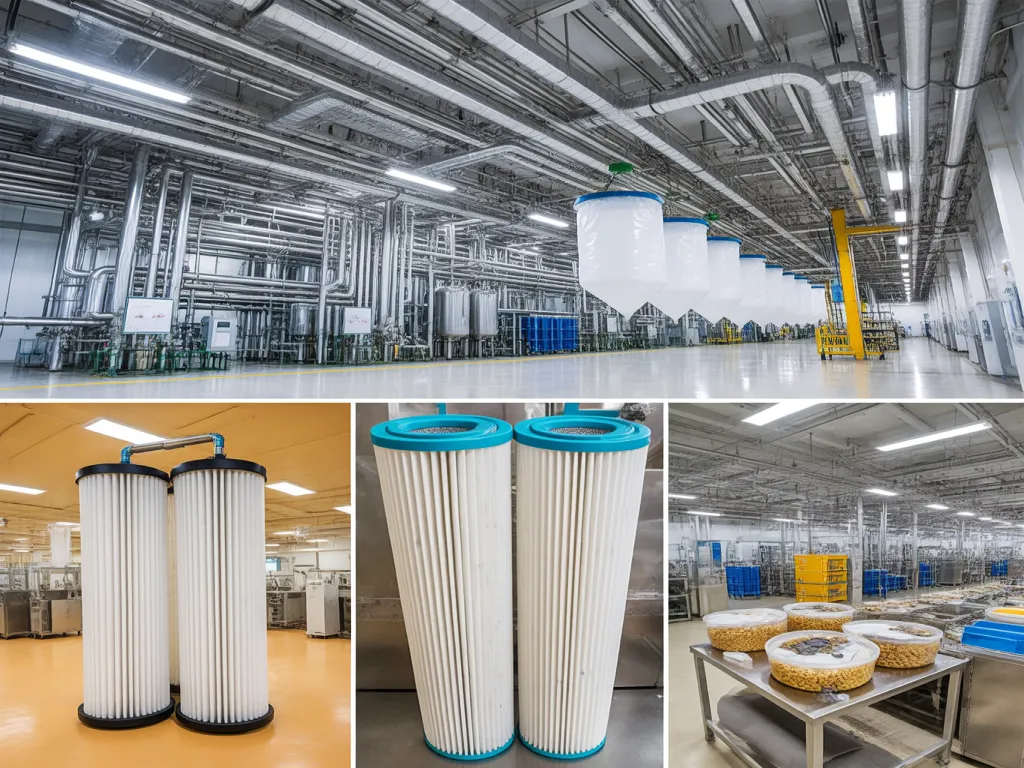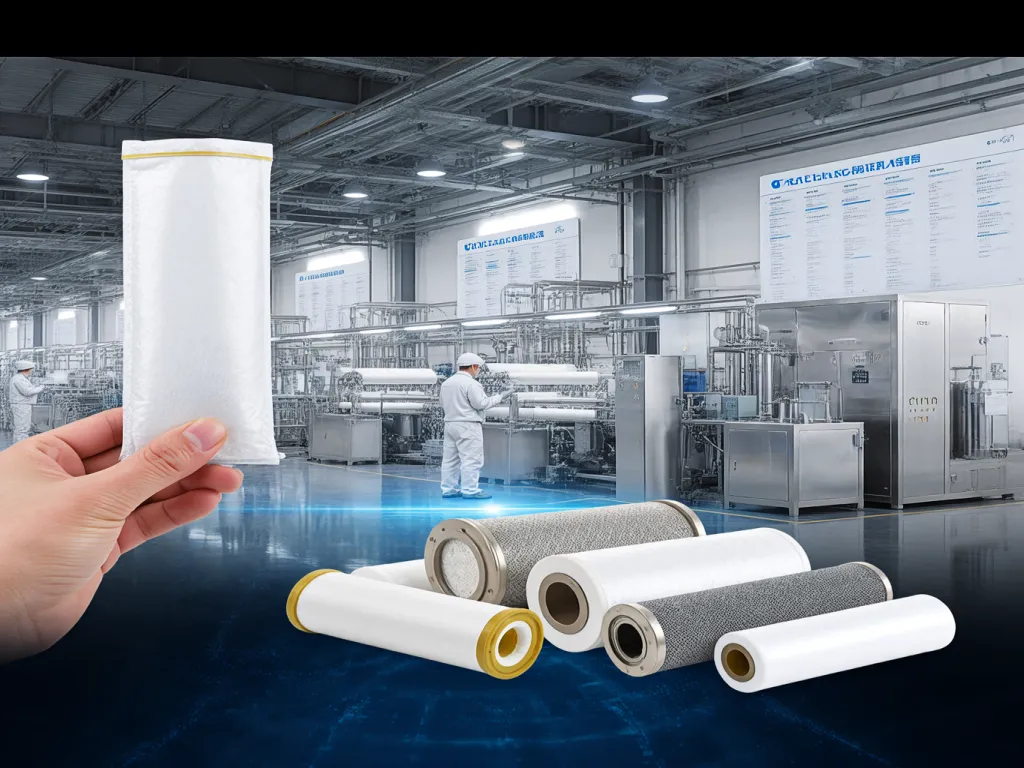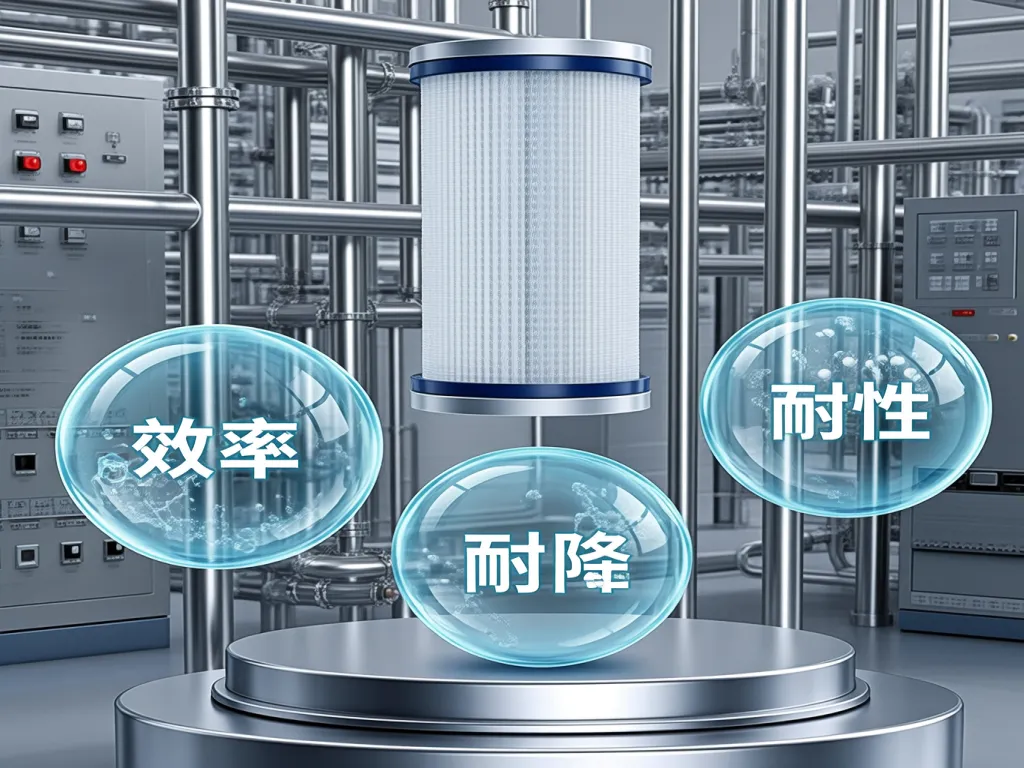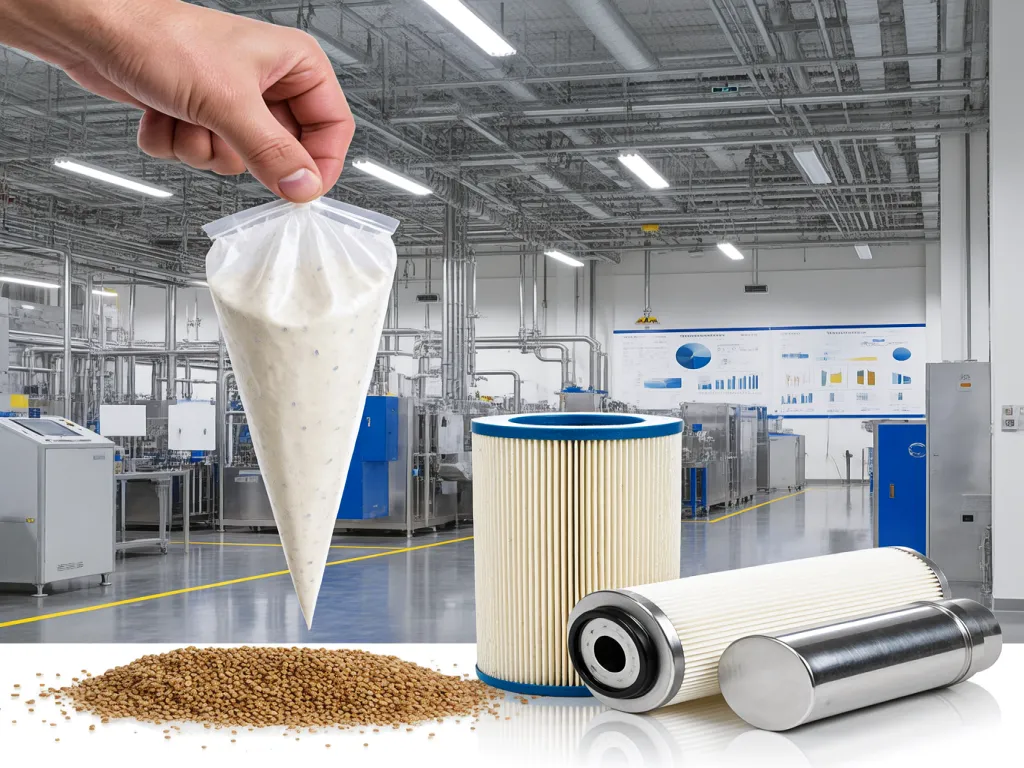1 Micron Filter Bag: Industrial Match Guide
In the world of industrial filtration, precision is everything. Whether you’re in the chemical, pharmaceutical, or food processing sector, choosing the right 1 micron filter bag can make or break your filtration efficiency. But how do you navigate the sea of options to find the one that perfectly matches your industrial demands? This guide dives deep into the specifics, ensuring you’re equipped to make an informed decision. Ready to unlock the secrets to optimal filtration?

Industrial Scenarios for 1 Micron Filter Bag: Tailoring Filtration Needs
When it comes to industrial filtration, the devil is in the details—especially when you’re dealing with the precision of 1 micron filter bags. These tiny marvels of engineering play a pivotal role across diverse sectors, from the harsh environments of chemical processing to the stringent standards of pharmaceutical manufacturing and the hygienic demands of food processing. Let’s dive into how each industry’s unique challenges shape the specific requirements for 1 micron filter bags.
Imagine a chemical plant where corrosive substances are the norm. Here, the 1 micron filter bag isn’t just about catching fine particles; it’s a battleground against chemical degradation. The materials used must withstand aggressive chemicals without compromising the filter’s integrity. Polypropylene or PTFE-coated filters often become the go-to choices, offering resistance to a wide range of chemicals while maintaining their filtration prowess. But it’s not just about the material; the construction matters too. Welded seams, instead of stitched, reduce the risk of chemical leaks, ensuring a safer working environment.
Now, shift gears to the pharmaceutical industry, where purity is paramount. Here, the 1 micron filter bag acts as a guardian against contaminants that could compromise drug efficacy or safety. The stakes are high, and so are the standards. Filters must not only capture minute particles but also do so without shedding fibers or introducing any foreign substances. This is where non-woven polyester or polypropylene filters shine, thanks to their low extractables and high purity levels. Moreover, the validation process for these filters is rigorous, involving tests for bacterial retention, chemical compatibility, and more, ensuring they meet the stringent requirements of pharmaceutical applications.
In the food processing industry, the focus shifts to hygiene and taste preservation. A 1 micron filter bag in this setting must prevent not just solid contaminants but also microbial intruders that could spoil the product or pose health risks. The materials chosen, such as food-grade nylon or polyester, must be FDA-approved and capable of withstanding repeated cleaning cycles without degrading. Additionally, the filter’s design must facilitate easy cleaning and replacement to minimize downtime and maintain optimal hygiene standards. The goal? To ensure that every bite or sip is free from unwanted particles, preserving the product’s quality and safety.
So, how do you ensure you’re picking the right 1 micron filter bag for your industrial scenario? It starts with understanding your specific needs. Are you dealing with corrosive chemicals, sensitive pharmaceuticals, or perishable food items? Each scenario demands a tailored approach, considering factors like material compatibility, filtration efficiency, and regulatory compliance. For more insights on selecting the right filtration equipment, you can refer to our guide on industrial filtration equipment selection. By aligning your filter selection with these industry-specific requirements, you’re not just buying a filter; you’re investing in the reliability, safety, and efficiency of your entire operation.

Chemical Industry: Battling Corrosion and Contamination
In the chemical industry, the 1 micron filter bag faces a dual challenge: capturing fine particles while resisting chemical attack. The choice of material is critical. Polypropylene, with its excellent chemical resistance, is a popular option. However, for more aggressive chemicals, PTFE-coated filters offer superior protection. But it’s not just about the material; the filter’s construction must also prevent chemical leaks. Welded seams, rather than stitched ones, minimize the risk of contamination, ensuring a safer and more efficient filtration process.
Pharmaceutical Industry: Purity and Validation
For the pharmaceutical industry, the 1 micron filter bag is a linchpin in maintaining product purity. Non-woven polyester or polypropylene filters are preferred for their low extractables and high purity levels. But the journey doesn’t end there. These filters undergo rigorous validation, including bacterial retention tests, chemical compatibility assessments, and more. For detailed standards on pharmaceutical filtration, you may refer to industry guidelines such as those from the US Pharmacopeia. The goal? To ensure that every filter meets the stringent standards required for pharmaceutical applications, safeguarding both product efficacy and patient safety.
Food Processing Industry: Hygiene and Taste Preservation
In the food processing industry, the 1 micron filter bag plays a crucial role in preserving hygiene and taste. Food-grade nylon or polyester filters, approved by regulatory bodies like the FDA, are essential. These materials must withstand repeated cleaning cycles without degrading, ensuring long-term performance. The filter’s design also matters. Easy cleaning and replacement features minimize downtime and maintain optimal hygiene standards, ensuring that every product is free from contaminants and retains its original taste and quality.

Key Performance Parameters for Selecting 1 Micron Filter Bags
First up, filtration efficiency.
This is the big one, right? After all, you’re buying a filter bag to, well, filter stuff out. But what does ‘efficiency’ really mean in this context? Simply put, it’s the measure of how effectively the filter bag captures particles of a specific size—in this case, 1 micron. A high-efficiency filter bag will trap more of these tiny particles, ensuring cleaner output. But here’s the kicker: efficiency isn’t a one-size-fits-all metric. It varies based on the particle size distribution in your feed stream. For instance, if your process generates a lot of 1-micron particles, you’ll want a bag with a higher efficiency rating for that size.
Now, onto pressure drop.
This is the resistance the filter bag offers to the flow of the liquid or gas being filtered. Think of it like trying to drink a thick milkshake through a narrow straw versus a wide one. The narrower the straw (or the higher the pressure drop), the harder it is to suck up the shake. In filtration terms, a high pressure drop means your pumps have to work harder, increasing energy consumption and potentially shortening the lifespan of your equipment. So, when selecting a 1 micron filter bag, you’ll want to balance efficiency with a manageable pressure drop. A bag that’s too efficient might clog quickly, leading to frequent replacements and higher operational costs. On the flip side, a bag with a low pressure drop but poor efficiency won’t do the job you need it to.
Chemical resistance is another crucial factor,
especially if you’re dealing with corrosive or reactive substances. Not all filter bags are created equal when it comes to withstanding chemical attack. Some materials, like polypropylene, offer excellent resistance to a wide range of chemicals, making them ideal for harsh environments. Others, like nylon, might be more susceptible to certain solvents or acids. For more insights on chemical compatibility, refer to resources like the Chemical Resistance Guide. So, how do these parameters impact your filtration process? Let’s break it down. High filtration efficiency means cleaner output, which is crucial in industries like pharmaceuticals or food and beverage, where product purity is non-negotiable. But remember, efficiency comes at a cost—literally, in terms of pressure drop. A high-efficiency bag might require more frequent cleaning or replacement, increasing downtime and maintenance costs. Chemical resistance, on the other hand, is all about longevity and safety. A filter bag that can’t withstand the chemicals in your process will degrade quickly, potentially releasing contaminants into your product stream or even causing equipment failure. In the worst-case scenario, a compromised filter bag could lead to a safety incident, putting your personnel and facility at risk. So, when you’re selecting a 1 micron filter bag, think beyond just the size. Consider your specific application, the nature of the particles you’re filtering, the chemical environment, and the balance between efficiency and pressure drop. By doing so, you’ll ensure that you’re not just buying a filter bag, but investing in a solution that meets your industrial needs head-on.

Choosing 1 Micron Filter Bags by Medium Properties: A Practical Guide
When it comes to industrial filtration, the devil is truly in the details—especially when you’re dealing with 1 micron filter bags. These tiny but mighty components play a crucial role in ensuring your processes run smoothly, efficiently, and safely. But how do you choose the right one when faced with varying medium properties like viscosity and particle size? Let’s dive in and demystify the process, ensuring you make an informed decision that boosts both filtering efficiency and equipment compatibility.
Viscosity Considerations
When dealing with high-viscosity fluids, it’s essential to choose filter bags that can handle the increased pressure without compromising performance. Materials like polypropylene and polyester are excellent choices due to their strength and chemical resistance. For instance, our polyester dust collector filter bags are specifically designed to withstand such demanding conditions. These materials ensure that the filter bag maintains its shape and integrity, even under the stress of viscous fluids, preventing clogs and ensuring consistent flow rates.
Particle Size and Filtration Structure
The size of particles you’re filtering plays a significant role in selecting the right filter bag. For fine particulates, a 1 micron filter bag is ideal. However, the bag’s structure is equally important. A multi-layered design can enhance filtration efficiency by trapping larger particles in the outer layers and finer particles in the inner layers. This prevents premature clogging and maintains optimal flow rates, ensuring your filtration process runs smoothly. Our carbon black fiberglass filter bags incorporate such a design, making them suitable for applications requiring high filtration precision.
Equipment Compatibility and Operating Conditions
Compatibility with your existing equipment is crucial when selecting a 1 micron filter bag. Ensure the bag fits your filter housing perfectly to avoid leaks and inefficiencies. Additionally, consider the operating temperature and pressure ranges of your system. Some materials, like PTFE, excel in extreme conditions, while others may not. For cement plants, our nonwoven aramid filter bags are a robust choice, designed to withstand high temperatures and abrasive environments. Always check the manufacturer’s specifications to ensure the filter bag can withstand your system’s demands.
Chemical Compatibility
The chemical composition of the medium you’re filtering is another critical factor. Different chemicals can react with certain filter bag materials, leading to degradation or failure. For corrosive chemicals, opt for materials like stainless steel or PTFE-coated bags. Our PTFE-coated polyester dust filter bags offer excellent chemical resistance, making them suitable for harsh environments. Consulting chemical compatibility charts provided by the manufacturer can help you avoid costly mistakes and ensure the longevity of your filter bags.
Selecting the ideal 1 micron filter bag is more than just a purchase—it’s a strategic move to elevate your industrial filtration game. By understanding the unique demands of your industry, focusing on key performance parameters, and aligning with medium properties, you’re setting the stage for unparalleled efficiency. Remember, the right 1 micron filter bag can transform your operations, boosting productivity and quality. So, what are you waiting for? Dive into our full guide and equip your industrial setup with the ultimate filtration partner. The journey to flawless filtration starts here—where will it take you next?
